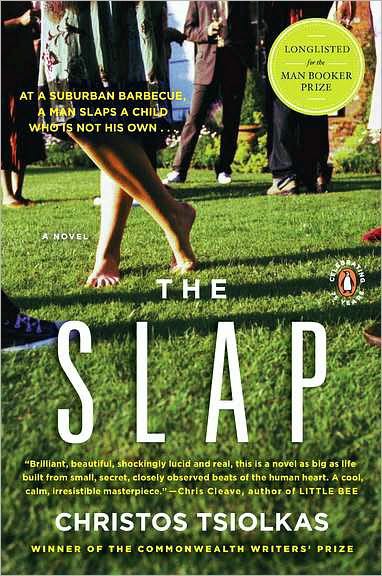
The Slap
کتاب های مرتبط
- اطلاعات
- نقد و بررسی
- دیدگاه کاربران
نقد و بررسی

February 1, 2010
This astute exploration of suburban aspirations and failings, winner of the Commonwealth Prize and Tsiolkas's first novel to be published in the U.S., opens at a barbecue in Melbourne, Australia, where nearly two dozen characters are introduced in the opening vignette. The reader barely has time to absorb their names and relationships before the pivotal event occurs: a man, Harry, slaps a bratty child who is threatening his son. At the center of the altercation are Hector, Harry's cousin, and Hector's wife, Aisha, who is friends with Rosie, the mother of the boy who's been slapped. When Rosie and her alcoholic husband press charges, longstanding relationships threaten to fall apart. Told from eight perspectives, each of which gets a novella-like chapter, the novel vividly demonstrates the wide-ranging effects of a single moment's rash decision on characters as varied as Harry's 71-year-old uncle and a high school student coming to terms with his sexuality. Beyond simply igniting the plot, the fateful slap draws attention to generational and philosophical differences regarding family life and the complex political, social, and ethnic milieu of contemporary Australia.

April 15, 2010
A group of family and friends gather for a backyard barbecue in suburban Melbourne, and the adults are all drinking a bit too much. The children are squabbling over computer games when a four-year-old with a temper tantrum brings on a disciplinary slap from an equally short-fused adult. The repercussions of this incident set off an ever-widening tsunami as the boys' parents threaten a lawsuit and their once tight-knit group lines up on one side or the other. Through the stories of eight of the partygoers, it becomes increasingly clear that everybody lies. These family-loving, house-proud, mostly successful Greek Australians could be kissing cousins of the American Sopranos. This essentially amoral crew own backstories rife with affairs, business misdeeds, and racial slurs. VERDICT This 2009 Commonwealth Writers' Prize winner will appeal to those who prefer their novels complex and multilayered. While there is not a lot to admire about most of the players in this exceptionally well-written story, their intertwined lives and slowly revealed connections make for a singular reading experience.Barbara Love, Kingston Frontenac P.L., Ont.
Copyright 2010 Library Journal, LLC Used with permission.

March 15, 2010
Although this is Australian author Tsiolkas fourth novel, it is the first to be published in the U.S. With its raw style, liberal use of profanity and racial epithets, and laserlike focus on the travails of suburban life, it is a down-and-dirty version of Tom Perrottas best-selling Little Children (2004). At a barbecue in a Melbourne suburb, a man loses his temper and slaps the child of the hosts friends. This incident unleashes a slew of divisive opinions, pitting friends and families against each other as the childs parents take the man to court. Told from eight different viewpoints, the novel also deftly fills in disparate backstories encompassing young and old, single and married, gay and straight, as well as depicting how multiculturalism is increasingly impacting the traditional Aussie ethos. For good measure, the author also throws in male vanity, infidelity, and homophobia. Tsiolkas in-your-face style is sure to alienate some readersthe childs parents, for example, are among the books most unlikable charactersbut his novel, which won the 2009 Commonwealth Prize, fairly radiates with vitality as it depicts the messy complications of family life.(Reprinted with permission of Booklist, copyright 2010, American Library Association.)

























دیدگاه کاربران